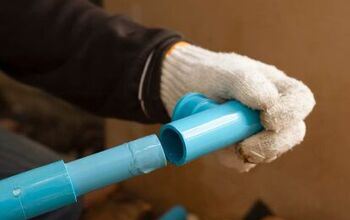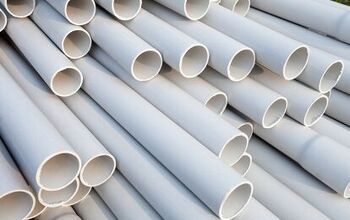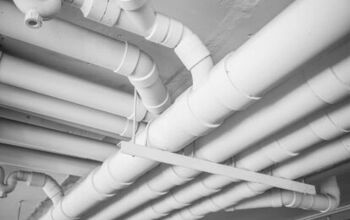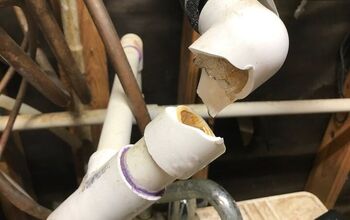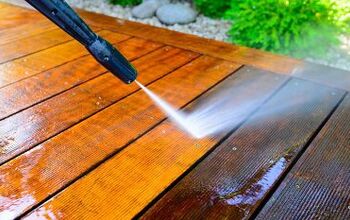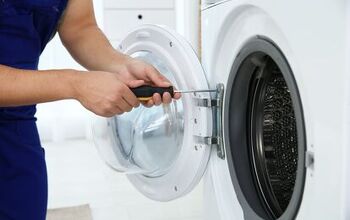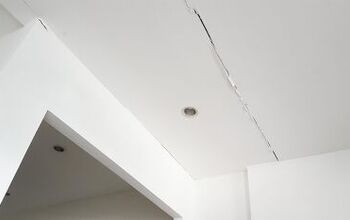Will PVC Cement Work On ABS? (Find Out Now!)

Whether you’re creating a plumbing/irrigation system or simply making a structure from PVC pipe, PVC cement is very beneficial. PVC cement is designed to break down and chemically bond two pieces of pipe together, making them inseparable. There are many different types of PVC pipe adhesives out there, how do you know which one to use. More specifically, you may be asking yourself: Will PVC cement work on ABS?
In short, each type of pipe is meant to be joined with its own cement. This means that PVC cement should only be used for joining PVC pipes and ABS cement should only be used for bonding ABS pipes. The only exception is transitional cement, which is used for welding ABS and PVC pipes together.
It’s important that you use the right type of cement in all applications to avoid weakening the pipes or making them unable to carry the preferred pressure. Whether you’re a professional plumber or DIYer, you can benefit from learning the different types of plastic pipes and solvent cements to understand which is best for your project.
Do You Need to Hire a Plumber?
Get free, zero-commitment quotes from pro contractors near you.

What is PVC Cement?
Simply put, PVC cement is not a glue, it is a chemical solvent. When PVC cement is applied, it softens and dissolves the top layer of a pipe and fitting material. This allows the material to literally fuse pieces of pipe together when they are connected. Since this fusion takes place at the molecular level, so when the solvent evaporates, the joint between two PVC parts becomes one singular piece.
Types of PVC Cement
Although there are three distinct types of plastic piping out there, all are commonly referred to as PVC pipe. Each type of PVC necessitates a different type of cement. Each type of PVC pipe requires a different type of solvent cement – PVC (Polyvinyl Chloride) and CPVC (Chlorinated Polyvinyl Chloride) are relatively similar, while ABS (Acrylonitrile Butadiene Styrene) is different in terms of chemical composition.
PVC Cement
PVC cement is formulated specifically for use with schedules 40 and 80 PVC pipe. The difference between these two types of PVC piping is thickness, as Schedule 40 pipes have thinner walls and are ideal for applications that involve low water pressure. Meanwhile, Schedule 80 pipe has thicker walls and can withstand higher PSI (pounds per square inch).
Regardless, when PVC cement is applied to either type of PVC pipe, the pipe will soften and then harden as the cement sets to create a joint that is stronger than the adjacent pipe and fittings. For those with sensitive skin, PVC cement can cause chemical burns so it’s important to avoid skin contact. PVC pipe and PVC cement are commonly used in DWV applications (drain, waste, and vent) – not potable water transport.
CPVC Cement
CPVC cement fuses pipe joints without creating hazardous vapors when joining PVC pipe meant for potable water transport. The cement is applied with the included dauber, evenly aligning the connecting surfaces. It’s important to avoid CPVC cements that have thickened, as this means the catalyzing agents have slightly evaporated, which reduces the bonding capability.
ABS Cement
ABS cement, on the other hand, is chemically engineered to react with the pipe’s specific chemical structure. It is intended for use with ABS piping, but can be used with CPVC or PVC pipes. ABS pipes are recommended for DWV applications and come in two main types: Solid Wall and Cellular Core.
It’s absolutely crucial that you use the proper type of cement in all applications, as this will prevent the pipe from weakening and make it unable to withstand the desired pressure.
How to Choose the Right Solvent Cement
In order to determine the right solvent cement for the pipes you are using, you must consider the following:
Pipe Material
First, you need to find out what type of plastic pipes you’ll be joining – PVC, ABS, or CPVC. Then, you can select the corresponding cement. For example, you should use PVC cement for PVC pipe fittings and ABS cement for ABS pipe fittings. This is one of the most crucial steps in the solvent welding process. If the pipes and cement are not compatible, the pipe and fitting will not be able to chemically fuse together – which can lead to joint failure.
Pipe Size
Next, you’ll need to think about the size of the pipes. The larger the pipe, the thicker viscosity the cement needs to be. You can choose from regular, medium, and heavy-bodied solvent cements. Consult the following table regarding the recommended solvent cement based on pipe size.
| Cement Body | All Schedules (Wall Thickness) | Pressure | Non-Pressure |
| Regular | Up to 2 inches | Up to 4 inches | |
| Medium | Up to 6 inches | ||
| Heavy | Up to 12 inches | Up to 18 inches | |
| Extra Heavy | Up to 24 inches | Up to 30 inches |
Application Conditions
You also want to confirm that a particular cement is rated for the moisture, temperature, and pressure conditions of the application. Additionally, consider whether you’re working with a potable water system or a non-pressure DWV system. Select the type of cement that is specifically formulated for that application.
Note: Depending on the time sensitivity of the project, you also may need to opt for a faster setting cement.
Local Codes
Last but not least, you want to confirm that the solvent cement you choose meets all the applicable codes and standards of the application site.
Do You Need to Hire a Plumber?
Get free, zero-commitment quotes from pro contractors near you.

Will PVC Cement Work on ABS?
Now that you understand the various types of solvent cement and plastic pipes, you may be wondering: Will PVC cement work on ABS pipes? In the plumbing industry it is highly recommended that you avoid using the wrong adhesive.
Therefore, PVC cement meant to be used for joining ABS pipes. In other words, PVC cement is only designed for PVC pipes, and ABS cement is only designed for ABS pipes. With the wrong adhesive, the plastic won’t melt properly. Using the wrong type of cement can also weaken the bond between pipes and make them unable to hold the intended pressure.
The only exception in this situation is transitional cement, which is designed to be used when multiple types of pipes need to be joined – such as ABS and PVC. This type of cement combines the chemical structures of the pipes, without resulting in harmful fumes or chemical reactions.

Jessica considers herself a home improvement and design enthusiast. She grew up surrounded by constant home improvement projects and owes most of what she knows to helping her dad renovate her childhood home. Being a Los Angeles resident, Jessica spends a lot of her time looking for her next DIY project and sharing her love for home design.
More by Jessica Stone










